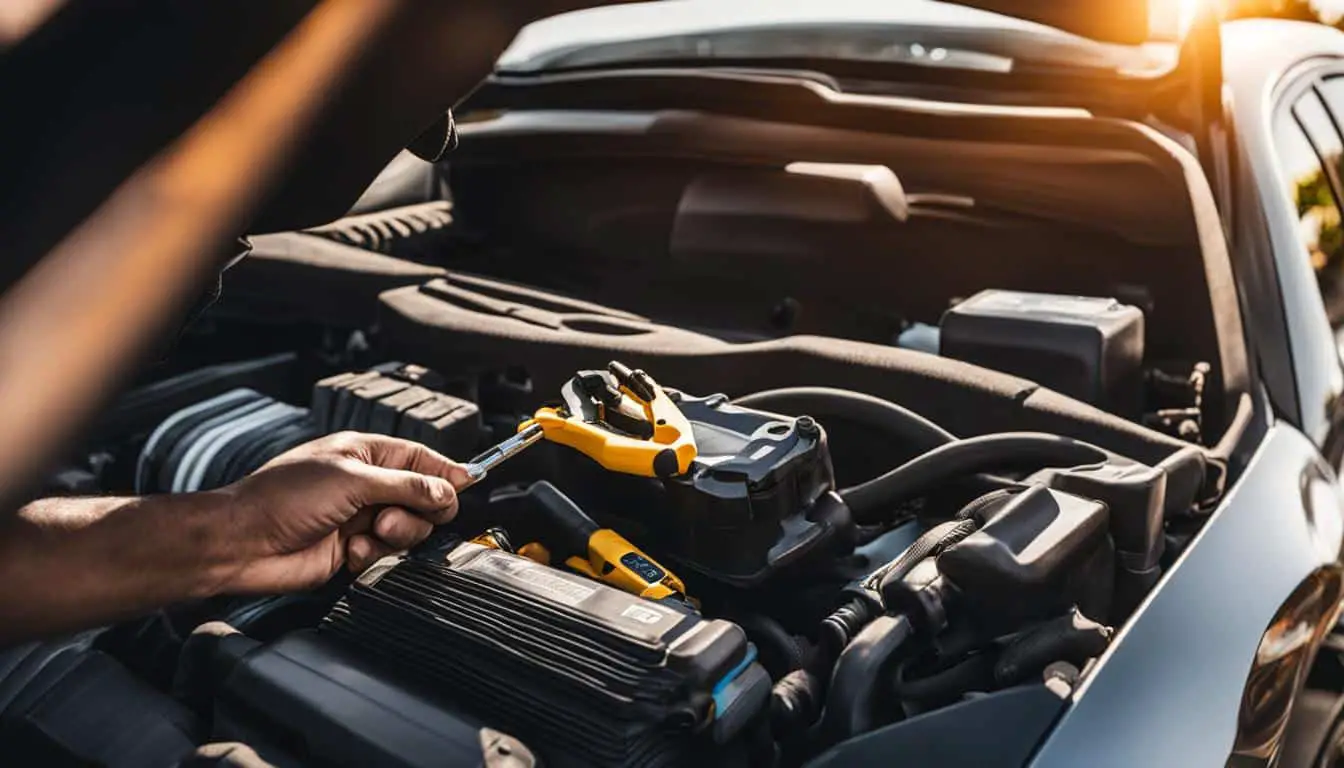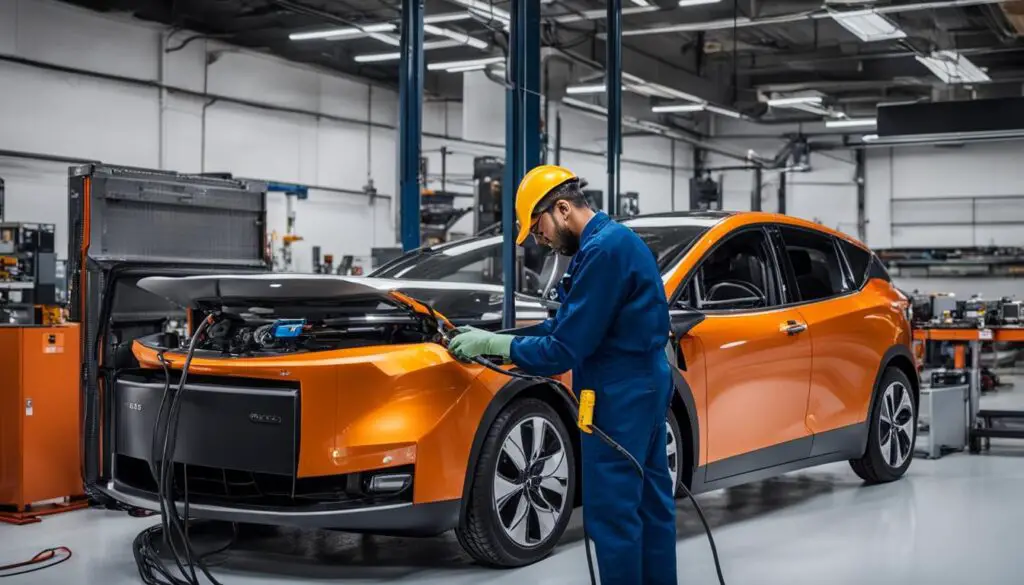
Maximizing Your EV Battery Life: Best Practices and Tips
Greetings, fellow electric vehicle enthusiasts! Today, I want to share with you some valuable insights on how to make the most out of your EV battery. As we all know, the battery is the heart and soul of an electric vehicle, and taking proper care of it is crucial to ensure optimal performance and longevity.
Electric vehicle battery degradation is a common concern for EV owners, but fear not! By following some simple maintenance tips and adopting the right practices, you can significantly extend the life of your EV battery. Let’s dive in and explore some of the best practices to maximize your EV battery’s lifespan.
Key Takeaways:
- Regularly charge your EV: Consistent charging helps maintain battery health.
- Drive moderately: Avoid aggressive acceleration and braking to reduce strain on the battery.
- Minimize deep discharging: Avoid letting your battery charge level drop too low.
- Avoid fast charging: Over-reliance on fast charging can contribute to accelerated battery degradation.
- Manage operating temperatures: Extreme hot or cold temperatures can affect battery performance and lifespan.
Now that we’ve covered the basics, let’s delve deeper into the importance of EV battery capacity and why it matters for your electric vehicle. Stay tuned!
Why is EV Battery Capacity Important?
An electric car’s battery capacity is a crucial factor in determining its range and overall performance. The capacity of an EV battery is measured in kilowatt-hours (kWh), with higher kWh indicating a longer range. Most EV battery packs typically range from 30kWh to 100kWh, depending on the model and manufacturer.
The range of an electric vehicle is directly influenced by its battery capacity. A larger battery capacity allows an EV to travel greater distances on a single charge, providing convenience and flexibility for drivers. It enables longer trips and eliminates the need for frequent recharging, making electric cars a viable option for everyday commuting as well as long-distance travel.
Besides range, battery capacity is also important when considering the longevity and warranty of your EV battery. EV manufacturers provide battery warranties that typically range from 8 years or 100,000 miles to 10 years or 150,000 miles. These warranties assure consumers of the battery’s expected performance and lifespan. As battery technology continues to advance, newer EV models offer improved efficiency, increased battery capacities, and longer warranties.
However, it’s crucial to note that EV batteries experience a natural reduction in capacity over time, typically ranging from 10% to 40% over the warranty period. This degradation is a result of various factors, including the chemistry of lithium-ion batteries and the cumulative effects of charging and discharging cycles. Once the battery capacity falls below 80%, the range and performance of the EV battery begin to decline, affecting the overall driving experience.
To help you visualize the relation between battery capacity and range, here’s a table showing the approximate range provided by different battery capacities:
| Battery Capacity (kWh) | Approximate Range (miles) |
|---|---|
| 30 | 100-120 |
| 40 | 140-160 |
| 60 | 200-240 |
| 80 | 260-300 |
| 100 | 320-380 |
As battery technology continues to evolve, we can expect increased battery capacities, offering even greater range and driving convenience for electric vehicle owners.
Factors Affecting EV Battery Degradation
EV battery degradation can be influenced by various factors, including the type of batteries used in electric vehicles. Most EVs are powered by lithium-ion cells, which offer high energy density and long-lasting performance.
One significant factor contributing to EV battery degradation is operating temperatures. Lithium-ion batteries perform optimally in moderate temperature ranges. Extreme heat or cold can have detrimental effects on battery life and reduce the overall driving range of an electric vehicle.
Another factor to consider is the frequency of fast charging, particularly Level 3 fast charging. While fast charging is convenient for quick top-ups, regular use of this charging method can accelerate battery degradation, affecting the battery’s long-term performance.
To mitigate these factors and minimize EV battery degradation, it is advisable to avoid prolonged exposure to extreme temperatures. Park your electric vehicle in shaded areas or garages during hot summer days and use climate control systems to maintain a comfortable temperature range for the battery.
Furthermore, it is recommended to limit the use of fast charging for everyday charging needs. Instead, rely on slower forms of charging, such as Level 2 charging, which is gentler on the battery and promotes its longevity.
By understanding and managing these factors, EV owners can ensure their battery retains optimal performance and longevity over time.
EV Battery Maintenance Best Practices
Proper EV battery maintenance is essential for maximizing its lifespan. Charging habits play a crucial role in battery health. It is advisable to avoid fully charging the battery regularly and instead aim for an 80-85% charge for daily usage. Similarly, fully discharging the battery should be avoided, and setting a minimum charge level, such as 25%, can help preserve battery life. Limiting the use of fast charging and adopting a smooth driving style can also contribute to battery longevity.
Additionally, leveraging smart charging solutions that offer intelligent charging schedules and predefined charging levels can optimize battery health and performance.

Implementing these best practices will ensure that your EV battery maintains its optimal performance and longevity.
Conclusion
Proper maintenance and care are crucial for maximizing the life and performance of your electric vehicle (EV) battery. By following these electric vehicle battery maintenance tips, you can significantly impact the longevity of your battery and ensure optimal performance and range throughout its lifespan.
First and foremost, it is essential to adhere to recommended charging habits. Avoid fully charging the battery regularly and aim for an 80-85% charge for daily usage. Fully discharging the battery should also be avoided, and setting a minimum charge level, such as 25%, can help preserve battery life.
In addition to charging habits, managing operating temperatures is key. Extreme heat or cold can have a negative impact on battery health and reduce driving range. It is important to avoid prolonged exposure to extreme temperatures whenever possible.
Finally, excessive fast charging should be minimized. Although fast charging can be convenient, frequent use can contribute to faster battery degradation. It is advisable to limit the use of fast charging for everyday charging needs and opt for regular charging whenever feasible.
By implementing these electric vehicle battery maintenance tips, you can ensure that your EV battery lasts as long as possible, providing you with a reliable and efficient driving experience for years to come.
FAQ
What is the most critical and expensive component of an electric vehicle (EV)?
The battery is the most critical and expensive component of an EV, accounting for a significant portion of the vehicle’s cost.
How can I extend the lifespan of my EV battery?
To maximize the value and performance of your EV battery, it is crucial to follow tips such as regular charging, moderate driving style, and minimizing deep discharging, fast charging, and exposure to extreme temperatures.
How is an electric car’s battery capacity measured?
An electric car’s battery capacity is measured in kilowatt-hours (kWh), with higher kWh indicating a longer range.
What are the typical ranges of EV battery packs?
Most EV battery packs range from 30kWh to 100kWh.
How long do EV battery warranties usually last?
EV manufacturers offer battery warranties of at least 8 years or 100,000 miles, with some offering up to 10 years or 150,000 miles.
Will an EV battery lose capacity over time?
Yes, over time, EV batteries will experience a reduction in capacity, typically ranging from 10% to 40% over the warranty period.
How does EV battery degradation occur?
EV battery degradation is primarily caused by cycles, operating temperatures, and time.
What factors influence EV battery degradation?
EV battery degradation is influenced by factors such as extreme temperatures, frequent use of Level 3 fast charging, and aggressive driving styles.
What maintenance practices are important for EV battery longevity?
Proper EV battery maintenance involves following recommended charging habits, managing operating temperatures, and avoiding excessive fast charging.
How can I maximize the lifespan of my EV battery?
By following best practices such as the recommended charging habits, managing operating temperatures, and avoiding excessive fast charging, you can significantly impact your EV battery’s longevity.
